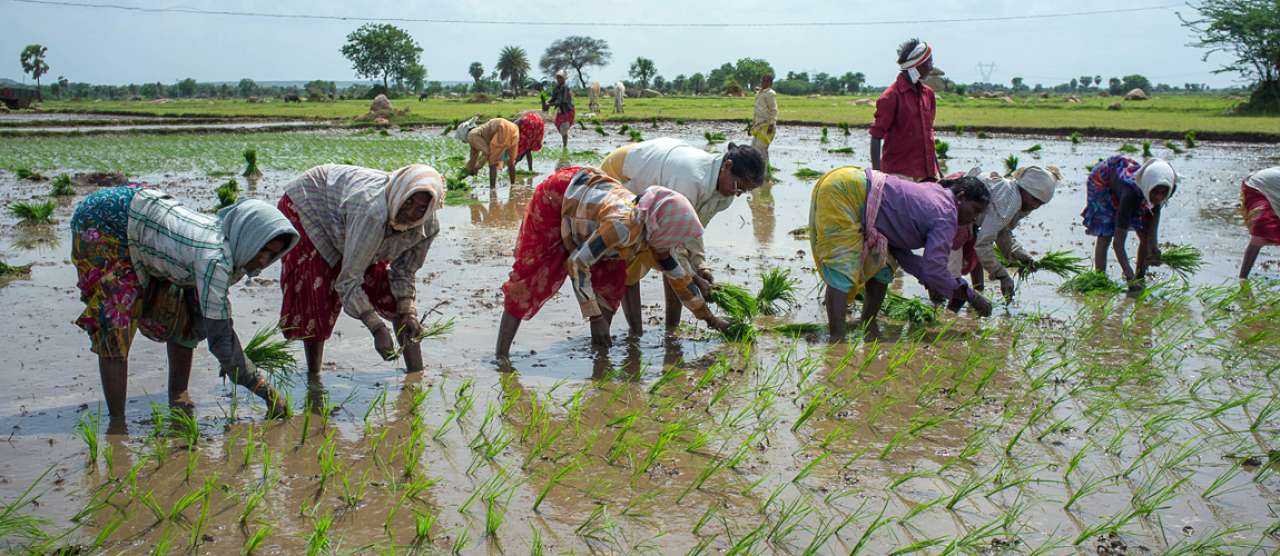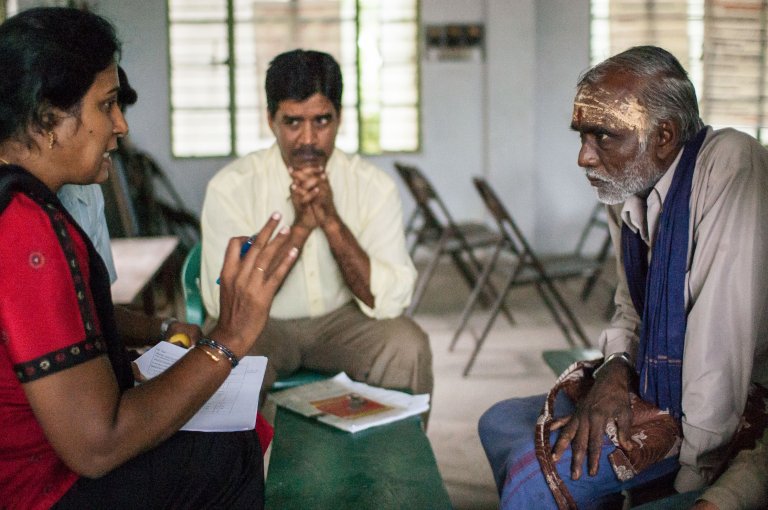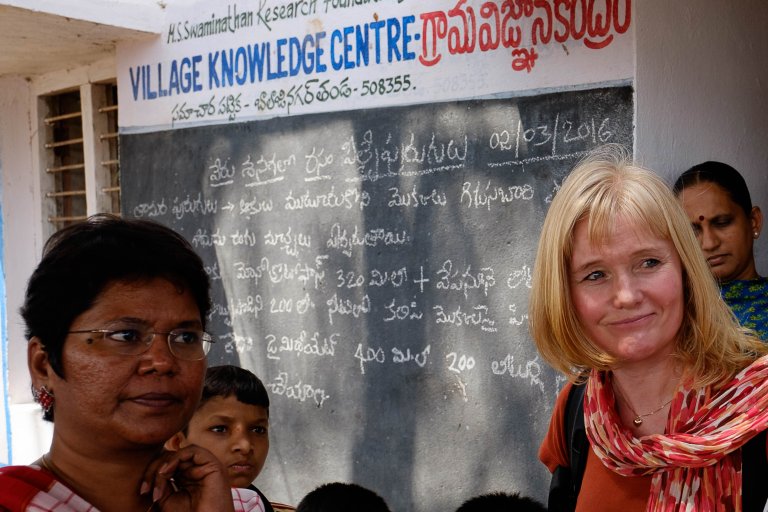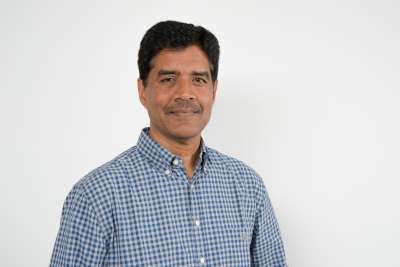Innovative platforms for knowledge sharing in India

Photo: Ragnar Våga Pedersen.
Sharing information through digital platforms and local knowledge hubs have proved an effective way of transferring knowledge on climate adaptation practices and agricultural related expertise to rural communities in India, as part of NIBIO’s ClimaAdapt project.
In countries such as India, extreme weather conditions caused by climate change pose a severe threat to food security. Fluctuating weather patterns have increasingly manifested themselves as serious droughts or damaging floods affecting agriculture production across the country. To help Indian farmers combat the challenges linked with climate change, it is critical to provide them with good and relevant information at the right time.
To address these issues, and find solutions to the climate-related challenges, the ClimaAdapt project was initiated in the three Indian provinces of Andhra Pradesh, Telangana and Tamil Nadu in 2012. The integrated project, which is a collaborative effort between the Norwegian Institute for Bioeconomy Research (NIBIO) and several Indian research institutes, aims to develop climate-smart agriculture technologies in India, to improve the adaptive capacity of local farmers.
Through the project, nearly 25.000 farmers in the study regions - including 28% of women – are now directly accessing information and knowledge on farming and climate adaption regularly from eight Village Knowledge Centres (VKCs) established within the project. More than 75.000 farmers are also connected indirectly to access knowledge through farmer-farmer communication and exchange of knowledge processes.
Ineffective extension services
The Programme Coordinator and Research Professor at NIBIO, Nagothu Udaya Sekhar, says conventional methods of agricultural extension (AE) services and knowledge transfer methods in India are no longer effective:
- It was not a demand driven system, and did not address the specific problems of the farmers and the local challenges. Government agencies had a monopoly over the AE services, and the science was developed in laboratories and controlled conditions and the results were taken to farmers. Consequently, the adoption and the impact of the scientific results and technologies were not very effective, Sekhar says.
Another significant challenge was that farmers in remote areas did not get access to the information on time or that the information was not suitable.
- It is important that farmers get information that is correct and timely. The information provided was not always relevant or complete, it was delayed or smallholder farmers could not take advantage of it due to lack of resources, he explains.

New demand-driven approach
However, Sekhar says India has seen a shift toward a more demand-driven AE system in recent years. There is now a greater private sector involvement with multiple models of extension services. This includes the use of new information and communication technologies (ICT), such as internet services and mobile phones, in order to reach the farmers faster and provide relevant information to farmers in remote villages.
- ICTs can transfer more information cheaper and faster. Traditionally it has not been possible to reach villages in remote places, as the Government lacked the necessary resources. Today, farmers tend to have mobile services, and this can be an effective tool for knowledge transfer, Shekar emphasises.
Daily updates
Mobile services have been utilised to great success in the ClimaAdapt project. VKCs send SMSes up to 2-3 times a day to registered farmers in the participating villages. This could be weather or market related information, or messages connected to farming practices during the cropping season.
- The focus of ClimaAdapt has been to provide timely information on climate resilient technologies, farming practices that farmers need to take up during the course of a cropping season, soil management, planting, crop management, need-based fertiliser and pesticide applications, harvesting, marketing etc., Sekhar explains.
- For instance, when the farmers are preparing for the season, they will receive advice on soil management, where they can go to purchase the best seeds etc. Then during the cropping season as needed, the farmers receive information on weeding, irrigation, pests and pesticides application. Farmers need different information to address the challenges caused by climate change, such as which crops and seeds are best in relation to drought and floods or methods to produce rice with less water.
- The aim is to link farmers and provide need-based, right and timely information that will help farmers to adapt to climate change, as well as increasing their yields and income, he says.

Village Knowledge Centres
VKCs provide an important platform for farmer interaction, not only with other farmers but also with scientists, government agencies and other stakeholders, as well as women involved in agriculture.
According to Sekhar, VKCs are innovative, multi-dimensional platforms that can provide a good stage for realising goals and networking. Currently, 2000-2500 farmers are connected to each VKC.
- They bridge the knowledge, gender, and digital divides and empower rural communities by fostering inclusive development and participatory communication.
The aim is to promote equitable access to information and knowledge among households from socially and economically marginalised rural communities. This will help them make informed decisions and improve their livelihoods, he says.
Women are often ignored in traditional agricultural extension systems, but VKCs are opening up new possibilities for them to get more actively involved and thus support gender mainstreaming.
- Traditionally, women are busy in the household and have not been able to meet extension workers. Also, these extension workers were most often men. Now, VKCs are there all the time and women are also working in the centres. This means that women are included in a different way, Sekhar says.
In addition, VKCs are a great tool for connecting farmers with ongoing extension government programmes and training programmes, he says.
Here, they can get on-the-spot information and advice, for example through video meetings with specialists and plant health clinics.
Ensuring sustainability
The feedback from the farmers has so far been good in the project villages, and they want to continue to support and be engaged with VKCs when the project ends, Sekhar says.
- We have built trust within the communities and enthusiasm has grown. Farmers are now willing to pay a fee for the maintenance of the VKCs after the project withdraws.
The VKCs have also developed into extensive information hubs, not only for agriculture, but for additional services within for example health, livestock research and social services.
The idea is that the village and farmers themselves will take over the centres when the project ends.
- We need to ensure that it is sustainable when we leave, and VKCs services can be continued. Village youth that have completed school are now being trained to maintain the centres. They also get paid for their time. But we are also working with Government and the private sector so that the VKC model from ClimaAdapt can be shared and scaled up.
In addition, there are companies looking at the ideas and putting them into farmer owned business models, as there is will to pay for the information.
However, ensuring sustainability of VKCs is still a challenge, according to Sekhar.
- There are people with different social and political interests who can create conflict at the local level. But we have managed to bring stakeholders together, which is very important, he concludes.
KONTAKTPERSON

ClimaAdapt
- The ClimaAdapt project is supported by the Ministry of Foreign Affairs in Norway, through the Royal Norwegian Embassy, New Delhi.
- The partners in the project are NIBIO, the International Water Management Institute, the M S Swaminathan Research Foundation, The International Water Management Institute (IWMI) , The Water and Land Management and Training Institute (WALAMTARI), Tamil Nadu Agricultural University (TNAU) and the Irrigation Management and Training Institute (IMTI). About 25-30 scientists with expertise in various disciplines including climate and hydrology modelling, agronomy, soil science, irrigation, pests and diseases, economics, policy and gender are working in the project.
- The Village Knowledge centres (VKC), leverage best-fit Information and Communication Technologies (ICTs) and function as a conduit for information, knowledge, and skill transfer to rural communities.
Lenker
ClimaAdaptKONTAKTPERSON

Tekst frå www.nibio.no kan brukast med tilvising til opphavskjelda. Bilete på www.nibio.no kan ikkje brukast utan samtykke frå kommunikasjonseininga. NIBIO har ikkje ansvar for innhald på eksterne nettstader som det er lenka til.
